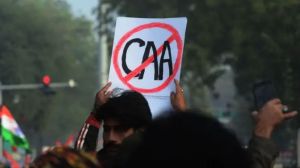Change in law against terror funding mooted 4 yrs ago, no word yet
Despite repeated reminders in the last four years from the Enforcement Directorate and intelligence agencies, the Government has failed to strike militant networks where it hurts most: their finance networks.

Despite repeated reminders in the last four years from the Enforcement Directorate (ED) and intelligence agencies, the Government has failed to strike militant networks where it hurts most: their finance networks.
Drafted at the instance of the NDA government, an ED proposal on amending the Foreign Exchange Management Act (FEMA) and making terror financing an act of criminality has been “under consideration” of the Ministries of Law and Finance since 2002.
The ED’s proposal for amending Section 3 of FEMA and for bringing in the Unlawful Activities (Prevention) Amendment Act, 2004 into the schedule of the Prevention of Money Laundering (Amendment) Act of 2005 has been backed by agencies like the Intelligence Bureau but sources say its non-implementation has seriously hampered trans-national investigations into terror financing.
The idea behind the amendments is to treat terror financing via hawala operations with the same severity as dealing with terrorists.
Several countries, ED officials maintain, have recently failed to cooperate on tracing terror funds due to the absence of the criminality clause in FEMA and PMLA.
Figures reveal that since 1998, just nine cases of terror funding have been investigated by the ED. While six of these cases dealt with hawala payments to the Lashkar-e-Toiba, the others were transactions made by the Hizb-ul-Mujahideen, the Jammu and Kashmir Mass Movement and the Babbar Khalsa.
Cases where the financial terror trail have been traced are the Delhi bomb blasts at the Liberty Cinema, Satyam Cinema, Sarojini Nagar and Paharganj (2005) and the attacks on Parliament House (2001) and Red Fort (2000).
The majority of these hawala transactions was traced to Dubai and Pakistan but the amount of funding investigated totalled a mere Rs 2.2 crore—a pittance compared to the extent of terror financing in India. In 1998, a HM militant from whom Rs 48.8 lakh was recovered, confessed the group had been receiving Rs 70 crore via the hawala route annually. In 2002, a Gujarati hawala operator arrested after four LeT operatives were held during a pre-Republic Day swoop, admitted to having handled Rs 20 crore worth of terror funds in the past. Presently, the ED is investigating three cases of terror financing via the hawala route in 2005, and officials say, further details from countries where the funds originated was awaited. The cases are:
• Liberty Cinema and Satyam Cinema blasts in New Delhi: After his arrest in the case, Babbar Khalsa leader, Jagtar Singh Hawara, had confessed to having received Rs 17 lakh of hawala funds from persons in India and Rs 6 lakh through money transfer from the Babbar Khalsa chief in Germany.
• Bomb Blasts in Sarojini Nagar and Paharganj in New Delhi: The main accused in the case, LeT’s Tariq Ahmed Dar confessed to having received hawala payments of Rs 4.94 lakh in September 2005 from Dubai from a company named Al Masha Trading and other payments of Rs 8.8 lakh through banking channels transferred to his bank accounts in Srinagar.
• LeT operative Zahid Hussain Shah: Investigations are in progress and authorities in Dubai have been asked for proof of transfer of Rs 5.5 lakh from a company named Dhanjani Trading to the LeT.
Following the repeal of FERA in 2000 and the introduction of a liberal foreign exchange regime via FEMA, foreign exchange violations became a civilian offence, invoking only penalties. The lacunae of FEMA not having a comprehensive criminal twist to club terrorism and hawala operators together was taken up first by the NDA government, when the ED was asked to prepare a draft amendment, which has since been kept pending.
With the Prevention of Money Laundering (Amendment) Act being legislated in 2005, the ED has also recommended that the 2004 Unlawful Activities (Prevention) Act—it replaced POTA—be brought under its ambit. But the proposal is lying unattended.



- 01
- 02
- 03
- 04
- 05




























